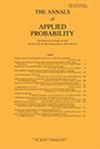Extended L-ensembles: A new representation for determinantal point processes
IF 1.8
2区 数学
Q2 STATISTICS & PROBABILITY
引用次数: 6
Abstract
Determinantal point processes (DPPs) are a class of repulsive point processes, popular for their relative simplicity. They are traditionally defined via their marginal distributions, but a subset of DPPs called"L-ensembles"have tractable likelihoods and are thus particularly easy to work with. Indeed, in many applications, DPPs are more naturally defined based on the L-ensemble formulation rather than through the marginal kernel. The fact that not all DPPs are L-ensembles is unfortunate, but there is a unifying description. We introduce here extended L-ensembles, and show that all DPPs are extended L-ensembles (and vice-versa). Extended L-ensembles have very simple likelihood functions, contain L-ensembles and projection DPPs as special cases. From a theoretical standpoint, they fix some pathologies in the usual formalism of DPPs, for instance the fact that projection DPPs are not L-ensembles. From a practical standpoint, they extend the set of kernel functions that may be used to define DPPs: we show that conditional positive definite kernels are good candidates for defining DPPs, including DPPs that need no spatial scale parameter. Finally, extended L-ensembles are based on so-called ``saddle-point matrices'', and we prove an extension of the Cauchy-Binet theorem for such matrices that may be of independent interest.扩展L-系综:行列式点过程的一种新表示
行列式点过程(DPP)是一类排斥点过程,因其相对简单而广受欢迎。传统上,它们是通过它们的边际分布来定义的,但被称为“L-集合”的DPP的子集具有易于处理的可能性,因此特别容易使用。事实上,在许多应用中,DPP是基于L-系综公式而不是通过边缘核更自然地定义的。事实上,并非所有DP都是L系综,这是不幸的,但有一个统一的描述。我们在这里介绍了扩展的L系综,并证明了所有的DP都是扩展的L系统(反之亦然)。扩展L-系综具有非常简单的似然函数,包含L-系综和投影DPP作为特例。从理论角度来看,他们在DPP的常见形式中修复了一些病理学,例如投影DPP不是L集合。从实用的角度来看,它们扩展了可用于定义DPP的核函数集:我们证明了条件正定核是定义DPP(包括不需要空间尺度参数的DPP)的良好候选者。最后,扩展的L-系综是基于所谓的“鞍点矩阵”,我们证明了Cauchy-Binet定理对这类可能独立感兴趣的矩阵的扩展。
本文章由计算机程序翻译,如有差异,请以英文原文为准。
求助全文
约1分钟内获得全文
求助全文
来源期刊

Annals of Applied Probability
数学-统计学与概率论
CiteScore
2.70
自引率
5.60%
发文量
108
审稿时长
6-12 weeks
期刊介绍:
The Annals of Applied Probability aims to publish research of the highest quality reflecting the varied facets of contemporary Applied Probability. Primary emphasis is placed on importance and originality.
 求助内容:
求助内容: 应助结果提醒方式:
应助结果提醒方式:


